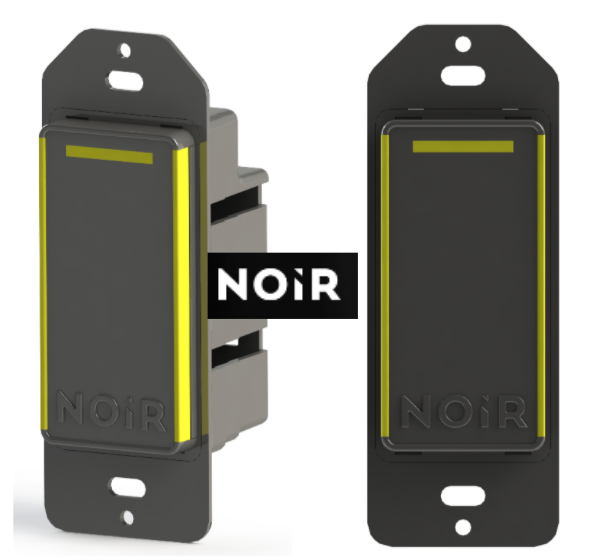An Intelligent, RADAR-based Light Switch
Noir Lighting is presenting at the Santa Cruz Works New Tech on November 4, 2020.
Commercial property owners are in the dark when it comes to understanding their building’s utilization rate. This knowledge gap results in $43,000 in excess operating and capital expenses (primarily unnecessary maintenance costs and underutilized space) per building per year (assumes 19,000 sq. ft. of space). Property owners often overbuild and fail to efficiently use their space. Today, periodic and flawed site surveys are used in an attempt to solve this problem. Enter Noir Lighting Inc. (“Noir”). Noir enables its customers to gain actionable space utilization insights by simply and inexpensively installing our RADAR-enabled intelligent light switch, and there is a huge market for this product.
According to Fortune Market Insights, the North American smart building systems market is expected to be a $31 billion opportunity by 2025. Initially, Noir is targeting government and university customers, which comprise nearly 28% ($8.5 billion) of the broader market opportunity. The entire market is growing at a 5-year CAGR of 10.5% and demand is being driven by property owners who desire to reduce their operating and capital expenses by leveraging room utilization data. To this end, the COVID-19 pandemic has amplified the need for our product as our customers seek to retain and attract leaseholders by keeping their costs at a minimum.
To gain share of this market, Noir has already engaged key decision makers at Arizona State University and the Cities of Phoenix and Gilbert who seek to participate in their pilot program upon securing FCC and UL certifications. In addition to assuring product-market fit through these pilots, upon achieving certification, Noir will quickly ramp-up discussions with other government clients and universities. To scale business beyond the initial pilot program, Noir will deploy the following go-to-market strategies: 1) Working with channel partners such as architectural firms, resellers, and integrators; 2) Hiring sales reps to work with customers in-the-field; 3) Launching digital marketing campaigns; and 4) Selectively providing free trial Switches to key customers (i.e. "try before you buy").
What has these customers so excited? First, the Switch is “plug-and-play” (i.e. installed like a traditional light switch and set-up/configured using an app). Second, the building data collected through their Switch (i.e. # of people in a room, how long people have been in a room, and where they are in a room) is analyzed using machine learning models to provide property owners with insightful cost-savings recommendations. For example: 1) reconfigure floor plans or rent out underutilized/unused space and 2) reduce the cleaning service intensity and maintenance of certain spaces. Noir performed preliminary FCC/UL testing and will deploy the Switch in 1Q21 using a recurring revenue model.
Noir will generate revenue through the sale of hardware product and by selling the highly valuable data collect through recurring subscription agreements. Based on discussions with Noir’s pilot program customers, there is demand for our hardware at a price point of $199 per unit. Noir believes they can also sell recurring subscription agreements for between $9.99 and $49.99 a month depending on the services and data feeds our customers desire. Taking the price point and production costs together, Noir anticipates a contribution margin of 50% and for this to increase to between 60% and 70% when recurring subscription agreements are included.
Noir’s two main competitors include VergeSense and Density. Their products are based on Infrared technology, which is far less precise than our RADAR technology. Noir’s technology provides greater sensitivity, room coverage, and detail that allows Noir to provide customers with more actionable cost-savings measures.
Noir has assembled a leadership team with the diverse set of skills needed to bring its breakthrough technology to market and achieve mass scale. Scott Menor, Noir’s CEO, has a Ph.D. in Physics from Arizona State University. His graduate research involved developing a scalable system for inferring a hierarchy of mechanical structure from statistical fluctuations in observed motion. Scott oversees Noir’s hardware and software engineering. Daniel Stone, Noir’s COO, has a masters in finance from the highly ranked London Business School. Daniel oversees Noir’s operations and business development efforts. Tyler Anderson, Noir’s Chief Design Officer, previously served as the Creative Director of Sequence Media Group where he led development of an in-house video management and distribution platform. Tyler oversees Noir’s design and marketing efforts.
Noir has also begun to assemble an advisory board. Bret Recor, the founder of Box Clever, a leading industrial design firm in San Francisco, serves as a technical hardware advisor. In addition, Bob Challinor, Senior Director at Stephen Gould, a large contract manufacturer, serves as a business advisor and has guided the team on product roll-out and supply chain.
Finally, Noir expects to develop acquisition interest from companies such as Lutron, Signify, and Google. The acceleration of smart building technologies has driven significant acquisition activity in this market such as the acquisitions of Cooper by Signify for $1.4B, Osram by AMS for $5.1B, and Nest by Google for $3.2B.


